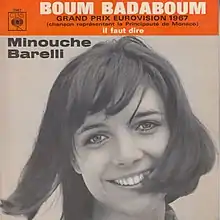Boum-Badaboum
"Boum-Badaboum" was the Monegasque entry in the Eurovision Song Contest 1967, performed in French by Minouche Barelli.
 | |
| Eurovision Song Contest 1967 entry | |
| Country | |
| Artist(s) | Minouche Barelli |
| Language | |
| Composer(s) | |
| Lyricist(s) | |
| Conductor | Aimé Barelli |
| Finals performance | |
| Final result | 5th |
| Final points | 10 |
| Entry chronology | |
| ◄ "Bien plus fort" (1966) | |
| "À chacun sa chanson" (1968) ► | |
The song was composed by Serge Gainsbourg, who previously had written France Gall's winning entry "Poupée de cire, poupée de son" in 1965, representing Luxembourg. Gainsbourg would also go on to write Joëlle Ursull's entry for France, "White and Black Blues", which finished 2nd in 1990.
"Boum Badadoum" is part of the long Eurovision tradition of nonsensical titles and lyrics. However, instead of the usual Eurovision cannons of love and happiness associated with the genre, Barelli instead asks to be allowed to live a full life before she is killed in a bomb attack. In this regard, the song could actually regarded as critical of the normal nonsensical "boom-boom" lyrics of Eurovision entries. The phrases "boum-badaboum" and "boum boum" and a countdown are repeated throughout the lyrics. Barelli recorded the song in four languages; French, English, German, and Italian - all versions with the same title.
The song was performed fourteenth on the night, following Norway's Kirsti Sparboe with "Dukkemann" and preceding Yugoslavia's Lado Leskovar with "Vse rože sveta". At the close of voting, it had received 10 points, placing 5th in a field of 17.
It was succeeded as Monegasque representative at the 1968 Contest by Line & Willy with "À chacun sa chanson".
Sources and external links
- Official Eurovision Song Contest site, history by year, 1967
- Detailed info and lyrics, The Diggiloo Thrush, "Boum-Badaboum".